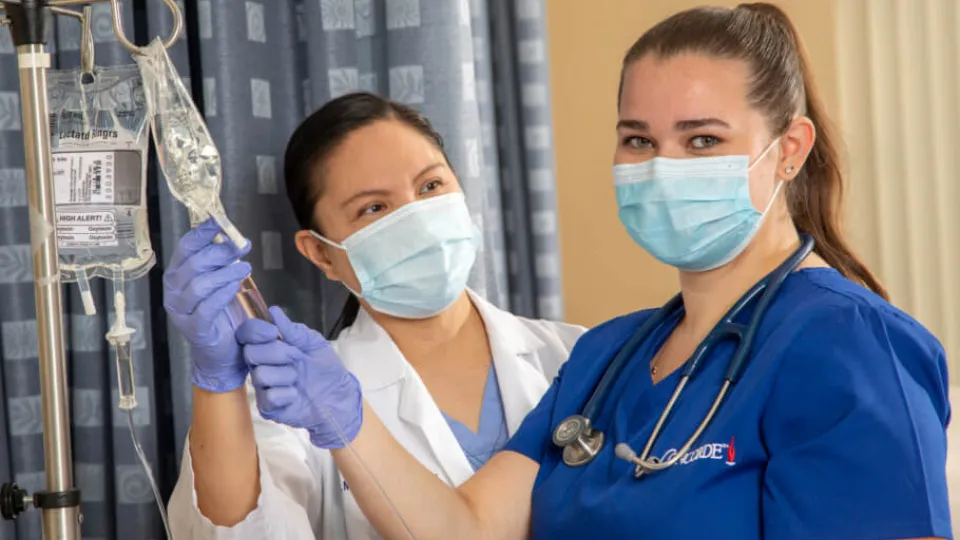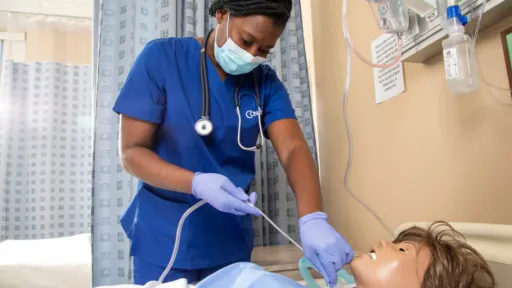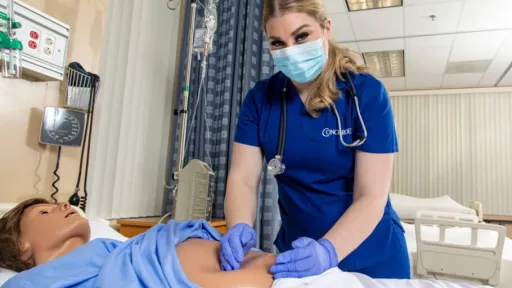
Registered nurses are vitally important to the health care industry. They provide essential support to physicians and specialists and deliver hands-on care and compassion to patients in a variety of settings. There are many pathways to achieve an RN credential, and you can choose a nursing education program to meet your needs.
Educational Pathways To Becoming an RN

There are three primary pathways to becoming an RN. All three options prepare you to sit for the National Council Licensure Examination for Registered Nurses (NCLEX-RN). However, there are significant differences in the depth of education. More extensive RN educational requirements are typically associated with better performance and greater knowledge, but longer degree programs are naturally a greater investment of time and money.
Associate Degree in Nursing
An ADN is a nursing degree that provides the core knowledge required to sit for the NCLEX-RN and become a registered nurse. The program typically takes two years, but you can complete an Associate of Applied Science degree in Nursing Practice from Concorde Career College - Memphis in as little as 21 months. This course of study includes prerequisites such as anatomy, biology, chemistry, and psychology. Once you've passed these core courses, you'll proceed to focused coursework that covers topics such as nursing fundamentals, microbiology, and immunology. It also explores specialized areas such as psychiatric, pediatric, and medical-surgical nursing.
An ADN program is shorter and typically involves a lower cost than a more advanced education, but it doesn't give you the same depth of knowledge. If you initially choose an ADN program as a path to prepare to obtain your license, you might want to consider an RN-to-BSN program later in your RN career path. Our RN-to-BSN program from Concorde applies your ADN credits to your continuing education so you can go on to complete your bachelor's degree in as little as 17 months. The transferability of credits is at the discretion of the receiving institution. Concorde does not guarantee that credits earned will transfer.
Bachelor of Science in Nursing
Over 45% of nurses enter the workforce with a bachelor's degree. BSN programs include all the courses taught in ADN programs with the addition of more in-depth classes on:
- Public and community health
- Humanities
- Nursing management
- Physical and social sciences
Facilities that employ a higher percentage of BSN nurses demonstrate lower patient mortality rates and better outcomes. When ADN graduates complete an RN-to-BSN program, they demonstrate greater communication, leadership, and research skills.
Though traditional bachelor's degree programs take four years of study, you can complete a Bachelor of Science in Nursing program at select Concorde campuses in as little as 29 months. Please check with your local campus for program availability.
Diploma Programs
The curriculum for Nursing diploma programs is similar to an ADN program, but may include more hands-on experience, giving graduates greater clinical knowledge. Upon completion, graduates receive a diploma rather than a degree.
Some hospitals collaborate with nursing schools so they can give students college credits for some of the courses associated with their training. In a few cases, students can earn both a diploma and an associate degree, though these are rare.
Core Curriculum and Clinical Training

Nursing programs include both clinical and classroom components. These programs begin with a well-rounded selection of general education courses that usually include:
- English composition
- Anatomy and physiology
- Microbiology
- Developmental psychology
- Sociology
- Psychology
- Communication
Degree-specific courses expand upon the nursing student's education and typically include:
- Nursing fundamentals
- Nursing skills
- Nursing pharmacology
- Clinical practice
- Clinical care management
- Mental health
- Management and professional concepts
- Medical terminology
- Pharmacology
- Pathophysiology
Every degree program is slightly different, so you should compare the specific courses of your top options to find the best program for your needs. BSN courses of study will naturally include more courses and in-depth training. This is why BSN-prepared nurses typically exhibit superior leadership, care management, critical thinking, and interprofessional collaboration skills. They also tend to excel at health promotion and exhibit greater skills with evidence-based practice.
Explore Concorde Nursing Programs near you!
NCLEX-RN

All registered nurse programs culminate in the NCLEX-RN. Passing the NCLEX-RN is a requirement for state licensure in all U.S. states and territories. In 2024, 73.26% of candidates passed the NCLEX-RN. However, among U.S.-educated first-time candidates, the pass rate was much higher, at 91.16%. Knowing what to expect and how to prepare may increase your chances of success.
Exam Format and Content Areas
The NCLEX-RN as it currently stands was launched in April 2023. The test will be updated again on March 31, 2026. At this time, it covers eight client needs categories, though the distribution of content and weighting of the answers in these categories is not equal.
| Client Needs Category | Distribution of Content | Weighting |
| Management of care | 18% | 15%-21% |
| Safety and infection control | 13% | 10%-16% |
| Health promotion and maintenance | 9% | 6%-12% |
| Psychosocial integrity | 9% | 6%-12% |
| Basic care and comfort | 9% | 6%-12% |
| Pharmacological and parenteral therapies | 16% | 13%-19% |
| Reduction of risk potential | 12% | 9%-15% |
| Physiological adaptation | 14% | 11%-17% |
The NCLEX-RN is computerized and delivers questions based on your previous responses. If you answer the questions correctly, the exam will increase in difficulty as you proceed. You have up to five hours to complete the exam. Depending on your answers, the test can have anywhere from 75 to 145 questions. It ends when you've achieved a passing or failing score, when you've completed the maximum 145 questions, or when your five-hour clock ends.
The questions on the NCLEX-RN are featured in several different formats:
- Multiple-choice questions with one or more than one answer
- Fill-in-the-blank questions
- Drag-and-drop questions to arrange the order of information
- Diagram or photo identification questions where you pinpoint the appropriate anatomical location or assessment area
Preparation Methods
Some students benefit from taking time off between their nursing school graduation and the time they plan to start practicing so they can thoroughly prepare for the NCLEX-RN. However, you shouldn't make this break so long that your nursing school material is no longer fresh. In most states, you must wait at least 45 days after graduation to take the exam.
You can prepare for your NCLEX-RN using resources such as:
- Study groups with fellow graduates
- Online groups
- Practice exams
- NCLEX-RN prep books and aids
- Podcasts, videos, or lectures
Related: NCLEX Tips for Passing the Exam and Understanding Test Requirements
State Licensure Requirements
The nursing licensure process varies by state, so it's important to check the rules and regulations in your area. To receive your nursing license you typically need to:
- Complete an accredited nursing program
- Pass the NCLEX-RN
- Pass a criminal background check
- Submit your application to the state board of nursing
Some states participate in the Nurse Licensure Compact. This allows nurses to practice across state lines with the same license they received in their home state. To participate in the NLC, you must reside in an NLC state and declare it your primary state of residence, adhere to the licensure requirements of your state, and maintain good standing there.
There are 43 NLC jurisdictions in the U.S. Pennsylvania and Guam have enacted partial implementation. NLC legislation is pending or awaiting implementation in several other areas. Of the United States, only California, Alaska, Minnesota, and Michigan have taken no action pertaining to the NLC.
Essential Skills for Success as an RN
While technical and clinical knowledge is crucial, an RN must also have a well-rounded set of soft skills. These capabilities are essential to provide high-quality patient care. Focus on developing and implementing these skills throughout your nursing education and career. Nurses who excel in their careers typically possess:
- Verbal and written communication skills
- Interpersonal skills
- Critical thinking skills
- Problem-solving abilities
- Attention to detail
- Organizational skills
- Emotional resilience
- Stress management
- Willingness to learn
- Adaptability
- Active and empathetic listening skills
- Compassion
Job Outlook and Career Opportunities
The job outlook for RNs is favorable with 6% growth projected between 2023 and 2033. Health care professionals are projected to be in high demand in the coming years as the older generation's population continues to increase. The prevalence of chronic illnesses is also on the rise, contributing to an ongoing need for registered nurses and other health care professionals who are equipped to assist them.
RNs have a wealth of diverse employment opportunities. Fifty-eight percent work in hospitals where they may work in a variety of departments including the emergency room, intensive care unit, maternity, or pediatrics. Another 19% of nurses work in ambulatory care services. Six percent work for the government, 5% work in nursing and residential care facilities, and 3% of RNs are employed in educational services.
Related: Types of Nursing Careers | How to Prepare for a Career in Nursing
Conclusion: Embarking on Your Journey To Becoming an RN
With so many pathways to becoming an RN, you can customize your journey to find the approach that best suits your lifestyle, budget, and passions. Whether you want to get to work quickly or start with the in-depth education of a bachelor's degree, you can find a course that meets your needs at Concorde. Start exploring your options today.
Rosseter, R. (2024). The impact of education on nursing practice. Www.aacnnursing.org; American Association of Colleges of Nursing. https://www.aacnnursing.org/news-data/fact-sheets/impact-of-education-on-nursing-practice
Contacts 2024 RN 1. (n.d.). https://www.ncsbn.org/public-files/NCLEX_Stats_2024_Q4_Passrates.pdf
U.S. Bureau of Labor Statistics. (2024, August 29). Registered nurses: Occupational outlook handbook: U.S. bureau of labor statistics. Bls.gov; U.S. Bureau of Labor Statistics. https://www.bls.gov/ooh/healthcare/registered-nurses.htm#tab-6
U.S. BUREAU OF LABOR STATISTICS. (2018, April 13). Registered Nurses : Occupational Outlook Handbook: : U.S. Bureau of Labor Statistics. Bls.gov. https://www.bls.gov/ooh/healthcare/registered-nurses.htm#tab-3
Take The Next Step Towards a Brighter Future
Interested in learning more about our Nursing (Pre-Licensure) program?
We have a Concorde representative ready to talk about what matters most to you. Get answers about start dates, curriculum, financial aid, scholarships and more!







